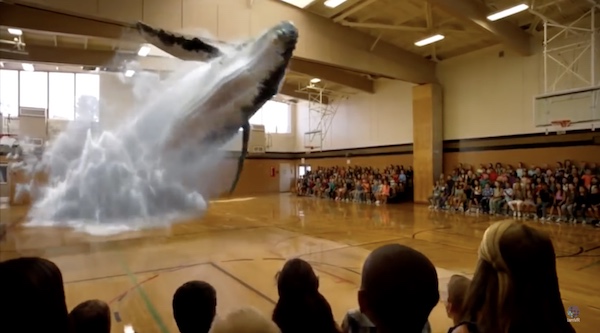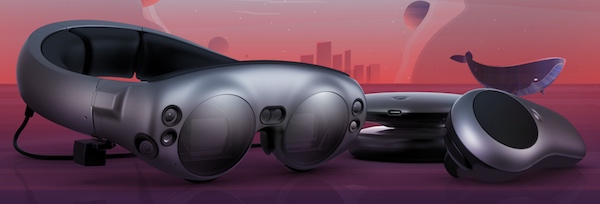As some of you may have heard, Magic Leap is suing its competitor, Nreal, in a lawsuit “Magic Leap Inc. v. Xu, 19-cv-03445, U.S. District Court, Northern District of California (San Francisco)” filed on June 17th.

While lawsuits between tech companies are not uncommon, this is a little different as Magic Leap claims that the former employee Chi Xu has stolen proprietary information from Magic Leap and used this information to create the Nreal Light headset shown at CES in 2019.
First a little background; Chi Xu left Magic Leap in 2016 and founded Nreal in 2017. Two years later he presented a new headset developed by his company that created quite some buzz at CES 2019. I do not know about any of you, but on the surface this is a little surprising indeed, considering that Magic Leap needed several years to finally reveal their One headset, it seems surprising that Nreal was able to do this in much less time without using some form of external intellectual property. I am not saying that this IP was stolen from Magic Leap, but it must have been coming from somewhere.
Of course this lawsuit, valid or invalid as it may be, has also a highly political aspect associated with it. One of the main allegations of the US government in their trade war with China is that China steals IP from US companies. This lawsuit filed in a US court could easily turn out to become a showdown between the USA and China going forward.
Since this just happened on 17th June, there is no real analysis to go by. Of course Magic Leap says that Xu stole IP and Xu says that is not the case. The allegations are even going as far as saying that Xu neglected his duties as a software engineer to gain access to the Magi Leap IP. They even point at the use of a whale in the Nreal promotion content as copying of a video created by Magic Leap many years ago. Take a look and let me know what you think.
 Magi Leap Whale; credit: Magic Leap
Magi Leap Whale; credit: Magic Leap
Nreal Whale; credit: Immersive Shooter
In the press we can find some early praise of Nreal by Forbes for example (How a former Magic Leap Engineer built a pair of lighter, more affordable glasses). In recent articles from c/net for example the tone is changing a little like “Magic Leap accuses ex-employee of stealing AR technology for Chinese company”.
This is all a little fuzzy at this time, but for the average user the comparison between the two headsets is quite difficult, as both companies are kind of tight-lipped when it comes to the specs and technological details of their respective devices. Here is what we can find in the public domain.
Specifications:
| Property | Magic Leap One | Nreal Light |
| Display Resolution | 2 million pixels | 2 X FHD displays |
| FOV | 50º horizontal | 52º |
| Display Type | Micro-mirror | ? |
| Connection | via cable to processor | via cable to processor |
| Tracking | 3 DoF | 3 DoF |
| Positional Tracking | 6 DoF | 6 DoF |
There is not much information on both devices and these are the aspects that seem to be most common on both devices. The appearance is a complete different story including the weight that is very different between the devices.  Magic Leap One; credit: Magic Leap
Magic Leap One; credit: Magic Leap
 Nreal Light; credit: Nreal
Nreal Light; credit: Nreal
On first look these two devices do not resemble each other, which does not prove that there is no illegal use of IP involved. For comparison, the US Patent Office search for both companies returns 497 patent applications and 139 granted patents for Magic Leap (at least you know now where some of their money want) and zero entries for Nreal. Does that mean Nreal does not believe in the use of patents to protect your IP or did they want to keep Magic Leap in the dark about their plans? Any conclusion is, at this time, highly speculative, at best (maybe they just filed in China instead).
Here is another point of view I want to inject in the discussion. If a person works for a high tech company and leaves his position to start working somewhere else, how can they leave and forget what they learned in the years before? Does this sound simlar to the situation in the Facebook / Oculus vs. ZeniMax lawsuit? That also seems to be a software engineer leaving one company and starting at the new company with some IP in tow.
As a general observation I would say that every tech company is looking to fill leadership positions with experienced people that can help them to move the company and products forward. As a consequence this person will have some form of behind the scenes information that is related to IP. Every employee has the right of choosing his employment, as the company has the right choosing its employees. This is typically handled by a non-compete clause you have to sign before you start working at a high tech company. Interestingly there is a gap between Xu leaving Magic Leap and starting up Nreal. Maybe this is related to the non-compete clause he had with Magic Leap. In addition Magic leap does not mention anything about a non-compete violation, but just the misuse of IP.
In terms of financial strength, the advantage is strongly in Magic Leaps corner. Lawsuits in the USA are expensive and are typically dragged out over years, just remember the lawsuits between Apple and Samsung, two financially strong companies. As far as we know this is still not settled completely. This raises the question if Nreal has the funds to defend themselves in a US court of law or if they chose to offer their product just outside of the USA, which would force Magic Leap to bring their lawsuit to China, which would be a distinct disadvantage for them, especially in the current political climate.
All in all it is impossible to make any assessment about the validity of this lawsuit at this point. Somebody has to analyze the underlying technology and judge of what is in the common domain and what is protected IP. – NH

